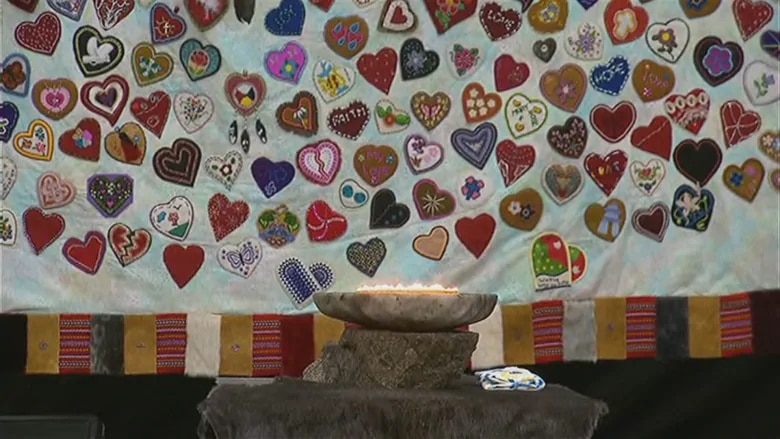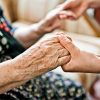
Although the Loretta Saunders Community Scholarship Fund, established to honour my sister, is still fairly new, it already has alleviated the financial burden of Indigenous women and girls attending post-secondary institutions for the past five years.
Loretta Saunders, a 26 year old university student, whom the Fund memorializes and honours, was also my big sister. She was unwaveringly passionate about creating a space for healing within herself, our family and Indigenous communities. She was described by her thesis supervisor, Dr. Darryl Leroux, as “a uniquely brilliant student, the likes of whom don’t come around often,” and I’ve seen that first hand.
I know that many Indigenous women and girls have the same fire Loretta had. She was able to pull herself away from circumstances that colonial Canada designed to hurl her deeper into an existence that Canadian society then labels as disposable. Loretta knew that was far from the truth and was working to deconstruct harmful and toxic misconceptions.
Loretta’s legacy lives on through the fund’s ability to help women and girls achieve their goals and dreams. While she was unable to complete her thesis on missing and murdered Indigenous women and girls when she was murdered, her legacy lives on within each of us who refuses to accept the notion that we are disposable.
It has been exciting and beautiful to see the Scholarship grow. I’m incredibly proud of the work that the Fund does and we look forward to being able to help more young Indigenous women across the country in their pursuit of knowledge.
Introducing Jocelyn Paul, this year’s recipient
The recipient of the 2019 Loretta Saunders Community Scholarship Fund is Masters of Science in Psychiatry Research student, Jocelyn Paul, of the Membertou First Nation.
I spoke with Jocelyn about her goals, accomplishments and what she wants to share with Indigenous women and girls who are pursuing higher education.
I’m super excited and proud of you! The other selection committee members and I had many applications to pore over but you were at the top of each of our lists. How are you feeling as the 2019 recipient?
I’m really just feeling over the moon, I’m so ecstatic and I feel so proud to be representing Loretta.
How did you hear about the scholarship?
I found out about the scholarship through Dalhousie website, they have a page that promotes African Nova Scotian and Indigenous scholarships, and I actually found it on there. I thought that’s something that’s right up my alley, that’s a scholarship that I would be really honoured to be awarded, why don’t I try applying and see what happens.
This one is a little more personal, what are some of the obstacles that you face as an indigenous woman pursuing higher education?
Definitely some of the obstacles are about the lack of understanding in terms of indigenous ways and traditions. The classic university setting of learning is very different from the way that people who are indigenous learn and absorb lessons.
I feel a lack of connections to others because you’re in this work and school mode. Sometimes this has been really hard for me. I’m naturally a talker, I always have been and I love telling stories. I love when people tell me stories, I could just talk all day… I feel that sometimes in academia I’m supposed to be professional and respectable instead of being honest and open about feelings. I really wear my heart on my sleeve so I feel that because of that sometimes it’s hard for me to connect with people.
In an indigenous culture there’s always so much connection. Everyone’s connected there, we talk about energies and that sort of thing, and we’re very in tune with what’s going on around us and I just feel like sometimes at university that gets lost.
Also, I believe that a lot of stereotypes still linger. As I’m doing Indigenous research there are a lot of stereotypes that I come across when I start telling people about what I do and my research. The questions that are asked, it shocks me that they would even think those are appropriate things to ask an Indigenous woman. So another thing that I’ve had to really get good at is learning how to give professional responses to what might be questions that are offensive to me or to indigenous culture or indigenous peoples.
What’s next for you? What are some of your goals?
Well I have small goals and I have large goals. I’d say my overarching goal is to become a clinical psychologist and work on First Nation reserves in Atlantic Canada, and even nationwide if I have the means to do so.
So what I mean by that is that it is my dream to be a clinical psychologist in Membertou first nation, which is the First Nation that I’m associated with, and then travel throughout Atlantic Canada.
I would continue to do Indigenous health research with my colleagues but I would be more than open to traveling to different First Nations and doing whatever needs to be done for the community or for a certain client.
With a regular therapist appointment you might go for a certain amount of time and that’s it, but I would incorporate Indigenous culture. There could be some smudging at the beginning, maybe we could have a feast. I’d really like to be a clinical psychologist and incorporate Indigenous knowledge and culture and beliefs. That’s my sort of overarching goal right now.
I’m really passionate about a lot of the different research projects that I’m dabbling in and specifically my Master’s thesis, really looking at racism and those sorts of social stressors in the context of a First Nations peoples, youths and adults who are living on reserve in Canada. I’m really looking forward to next year of doing all this research. What do these social stressors look like. What are ways that they have incorporated Indigenous culture in order to buffer against their increased psychological distress.
I think it’s really important to do this kind of research if we’re interested in influencing policies and programming in order to make the lives of First Nations youths and adults better.
A lot of credit goes to my amazing Master’s thesis supervisor, Dr Amy Bombay. She’s just been absolutely amazing and she’s a superstar. I strive to be like her, and hope I can be as influential and powerful and as wonderful of a person is she is one day.
Do you have any words of encouragement for future applicants and young Indigenous women who are considering post secondary education?
Some of my words of wisdom would be that you must find those people that are your rocks, who keep you grounded and support you. My family has always been so important to me and they’ve always really kept me grounded. And don’t worry about the social events, going drinking or partying or anything like that, those sorts of things are fine once in a while when you’re celebrating something, but I’d say try and keep a work-life balance.
Every Sunday is my mental health day, so whatever I do, if I need to have a shower for an hour or if I need to go to the gym, whatever I need to do for myself I do. Make sure you give yourself time for healing and make sure you go out into nature. I really think nature is so important.
I recently created a resource guide that has a whole bunch of information about the different Atlantic Canadian universities and the Indigenous resources they offer. I made it in partnership with the Atlantic Indigenous Mentorship Network and a few other organizations. It’s going to be published soon and it will be really beneficial.
But I’d say, just go for it, decide you want to live in a big city, or if you want to be close to home. Don’t be afraid of failing, don’t be afraid of changing your degree, don’t be afraid of going to university and not knowing what you want to do until the final year. Don’t be quiet if you’re naturally loud, just be yourself. The people that matter won’t mind and the people that mind don’t matter. Just be yourself and you’ll find your people.
The Loretta Saunders Community Scholarship Fund accepts tax deductible donations and donations of gift cards, lightly used laptops, and other necessities for university life upon request. Gift cards, laptops and other items are given to applicants who are unsuccessful in receiving the scholarship but deserve support in their academic endeavours.
Currently the Fund serves the Atlantic Provinces only, but the board and committee hope that by 2020 we will be able to help Indigenous women and girls across Canada focus on their studies and direct their energy away from financial stresses. The success for our women and girls to achieve their academic dreams and goals means growth, healing and success for our communities as a whole.
If you’d like to donate as an individual or organization and receive a tax deductible receipt, click here.
With a special thanks to our generous donors who make publication of the Nova Scotia Advocate possible.
Subscribe to the Nova Scotia Advocate weekly digest and never miss an article again. It’s free!



